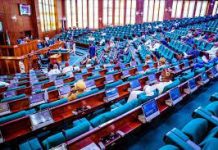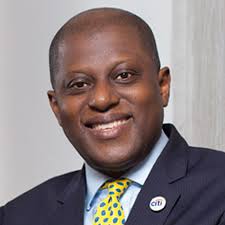#TrackNigeria – Finally, the long awaited presidential campaign and elections are over after intensive speculations, projections, plots, prayers and counter prayers. Muhammadu Buhari of the APC won with15,191,847 and his main opponent, Atiku Abubakar came second with 11,262,978 votes. With this considerable gap, some might assume the question of victory is settled in favour of Buhari. In Nigeria, nothing can be that simple.
The leading opposition candidate came out to describe Saturday’s election essentially as a farce. According to Atiku Abubakar: “On Election Day, we saw the implementation of grand theft of the people’s will. I am not one for hyperbole so I will just let the facts speak for themselves”. The “facts” he cited included the following. In Akwa Ibom for instance, the results showed a statistical impossibility of a 62% drop in voter numbers from the 2015 elections even where voter registration and PVC collection rates were much higher than in 2015. This pattern was repeated in strongholds of the People’s Democratic Party, including in Delta, Rivers, Abia and Benue states. As this was occurring, we saw another statistical impossibility wherein voter turnout and numbers increased astronomically in Borno State by an almost miraculous 82% in the midst of increased insecurity. These of course are not facts but speculations on statistical trends that are not directly connected with the elections. Nonetheless, he rejected the results based on “the electoral fraud perpetrated by the Buhari administration this past Saturday” and has decided to go to court, which is his right.
Atiku Abubakar claims to have the real figures that would enable him to win in court. As an active observer of the elections, our team did not see evidence of the massive fraud he claimed happened. Is possible we were not very observant. The numerous other observer teams, national and international, also did not report massive fraud and theft of Mr. Abubakar’s mandate. Our sister organization, YIAGA AFRICA who conducted a parallel vote count using the famous PVT methodology, the gold standard in citizen observation methodology that uses statistics and ICT have also come to a clear conclusion using a random statistical sample of 1,515 polling units located in every local government area and states of the country. Their findings on the presidential elections are as follows: “All Progressives Congress, APC, should receive between 50.0 per cent and 55.8 per cent of the votes. The People’s Democratic Party, PDP, should receive between 41.2 per cent and 47.0 per cent of the votes. These figures are consistent with the official results as announced by INEC. For both APC and PDP, the official results fall within the PVT estimated ranges.”
I observed the elections with the Centre for Democracy and Development, which deployed over 3500 field observers, spread across the country. The Centre also established a fake news tracking and analysis centre, and an Election Analysis Centre (EAC), comprising of leading experts on elections and democracy. In our report, we commended Nigerians for trooping out in large numbers to cast their vote, in spite of the numerous challenges many of them faced, during the rescheduled presidential and national assembly elections. Nigerian voters are the winners of the elections, because they took ownership of the voting process as engaged citizens determined to make their votes count. Of course, there were numerous challenges that they faced.
The conduct of the elections went on smoothly in most parts of the country, with ad-hoc staff arriving on time. However, significant logistical challenges marred the conduct of the elections in many parts of the country. For example, ballot papers were insufficient in some polling units, while in others there were lack of other sensitive and non-sensitive materials, such as indelible ink, ballots, or result sheets.
Smart card readers (SCRs) remain one of the most vital integrity checks of elections in Nigeria. Although many of them failed, malfunctioned SCRs were promptly corrected by roving staff of INEC, deployed for the purpose. It is noteworthy that generally most of the SCRs worked well and therefore played a role in ensuring the integrity of the elections. We however expressed our concerns that in a number of polling units where SCRs malfunctioned, voting proceeded without use of the machines. The spread of such incidents would be the key evidence that the justice system would use in adjudicating the matter.
In the period leading up to the elections, there were widespread fear that security agencies would be used massively as agents of voter suppression. It did not happen on a large scale. Adequate security personnel were generally deployed for duty in most polling units and they did their job fairy well. There were cases of illegal use of security agents that were observed and once again, establishing the scale would be key in determining the credibility of the elections.
On election day, Nigerians woke to the news that there had been bomb blasts near Maiduguri, and also on the eve of election day there was report of Boko Haram attacks in Gaidam, Yobe State. We observed that this insecurity led to the relocation of voters from Gujba to Damaturu to cast their votes. Similarly, voters in Madagali were also relocated to a safe location in Adamawa to cast their votes. In addition, violence marred the polls in some areas in Lagos, Ebonyi, Imo, Rivers, Osun, Oyo, Delta, Kogi and Akwa Ibom leading to the death of about twenty people on election day.
Another problem we observed was that in many places, the secrecy of the ballot was violated, and voters cast their ballot in full public view in some polling units where voting cubicles were not used. This might not be unconnected to the practice of vote buying, which was also observed in some polling units in Bayelsa, Enugu, Kano and Osun states amongst others. Its patterns varied according to geopolitical zones. In some places, people are requested to put their names down and phone numbers so that they can be paid later. However, most disturbing was the situation where party agents went around with the voters’ register, hustled voters and negotiated for their votes.
We also noticed that in spite of the warning from INEC that VIPs, notably elective public political officers, should not disrupt voting on election day, there were high profile incidents of disruption of voting processes through the abuse of the power of incumbency in states such as Akwa Ibom, Bauchi, Imo, Kogi, Kwara, Lagos and Rivers, where huge supporters escorted politicians to the polling units. On the whole, there are sufficient problems to warrant a close examination of the whole process.
The elections provided further illustration of the anti-democratic political culture of the country’s mainstream political class, through their engagement in various forms of political brigandage and their do-or-die attitude to elections. In places like Imo and Rivers States, incumbents abused their powers to determine outcomes of the elections. If the ordinary citizens are the winners of these elections, the underlying zero-sum attitude and approach of the country’s mainstream political class leaves a great deal to be desired.
My greatest concern about the election, which is very evident in the map of voters in the presidential elections is the ethno-religious bias in the geographical distribution of the votes. In the period leading up and during the elections, there were excessively high levels of ethno-religious mobilisation and use of hate-speech. This is a matter for concern and Nigeria needs to be much more proactive in addressing the issues around inclusiveness.
These issues notwithstanding, my assessment is that the voting related processes and management went generally well despite hitches outlined above. That is why I started by asserting that the results appear to reflect the outcome the majority of Nigerians voted for. We must continue to commend the determination of Nigerians to exercise their franchise despite the odds militating against their ability to do so. We hope that the identified problems on election day will be addressed adequately and urgently before the forthcoming governorship and state houses of assembly elections.



